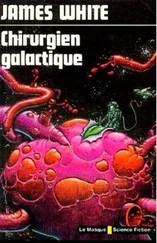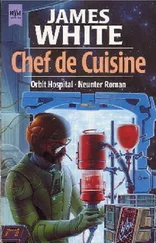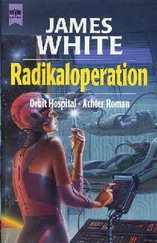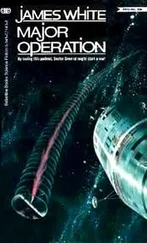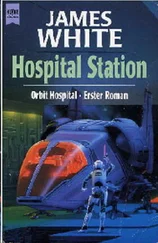No matter how hard he tried to avoid it, his mind always slipped back into the same pit of despair. Until this moment “loneliness” had been a word with only a shadow of meaning. Until now nobody had known the crushing sense of loss and grief of a man whose loved ones, friends and everyone else have been taken away to leave him alone on a dead world. The fact that, by his own subjective time, only three or four days had gone by since Alice had kissed him a tearful good night and Pellew had growled his best wishes, and Ross’s world had contained a crowded hospital which was part of a civilization covering a planet whose every square yard had teemed with life of some sort, made his loss that much more terrible.
Many times Ross wanted to die. But he was too young and healthy to die of grief, and any more positive approach to dying would certainly be checked by the Sister. And so his despair found its lowest point and, because the only way to go from there was up, it began to recede. Not that he felt hope or anything like it; it was simply an acceptance of his present circumstances and the feeling that perhaps he should look more closely into them before he made a more determined effort to end it all. After all, he had a hospital, hundreds of robots and he didn’t know what else at his disposal and taking stock seemed like a good idea. Besides, it would keep his mind occupied.
At about the same time Ross made this decision he discovered that while the robot continued to ignore all his orders and/or invective, it would accede to reasonable requests of the type which convalescent patients could be expected to make. The Ward Sister did not forbid him to read.
The first book Ross asked for was, of course, Pellew’s diary. He read it through carefully from beginning to end, then reread it in conjunction with the green folder. Now he knew exactly what had happened to the hospital, and when. Pellew had begun his diary as the usual personal record of events, but toward the end it became a series of orders and suggestions directed toward Ross himself, when the doctor had realized that he was likely to be the only survivor with medical training.
Ross requested books which Dr. Pellew had suggested he study. Works on genetics for the most part, which must have been heavy going even for the good Doctor. For his own information he asked for books on robotics, and one of them turned out to be a popularization which he could just barely understand. He also began to make plans for the time when the Sister would stop calling him “Mr. Ross.”
Then one “morning” when the lights had come on after his eight-hour sleep period the robot placed three food cans beside him and asked, “Have you any instructions, sir?”
Ross said yes with quite unnecessary force, and while he was struggling into a fresh toga he began issuing orders. Some of them, he feared, were pretty tall orders. First, he wanted the case histories of the people who had died between the time of Pellew’s death and his own awakening. He was not hopeful of finding survivors in Deep Sleep, because the Sister had stated that there were none. But Pellew’s diary had said that Ross was the only survivor with medical training, which implied that there must be other survivors without training, and he wanted that point cleared up. Second, he asked for a census to be made of all the operable or repairable robots in the hospital, their numbers, types, relative intelligence and specialties. Any who had been placed in a state of low alert by humans prior to their deaths were to be reactivated. Third, he wanted a report on the water, food and power supply position.
Ross paused. From his reading he knew that the Sister had been relaying his instructions as he had spoken them to the other robots in this level, who, because Sister’s transmitter could not punch a signal through a mile of solid rock, would relay them physically to the higher levels.
He took a deep breath and went on: “You will detail cleaning and maintenance robots to repair and clear the damaged upper levels, including where necessary elevators and communication circuits. And I want a small area of the surface cleared of ash and soil samples taken at one-foot intervals to a depth of twenty feet. I’ll require samples of the air and sea water as well.”
Ross hesitated, then asked, “Does your training, I mean programming, enable you to do an air or soil analysis?”
“No, sir,” the Sister replied, “but there are Pathology Sisters capable of doing so.”
“Very well, put them onto it…”
He broke off as a Cleaner rolled in, deposited a small pile of folders beside him and began making his bed. The notes Ross had made while lying down were knocked to the floor, and the robot picked them up and thrust them into its built-in wastepaper basket.
“I want those back!” said Ross angrily. When the sheets had been returned, slightly crumpled, he added, “I’ll do my own tidying up from now on. No Cleaners are to come here unless I send for them.”
When the robot had gone Ross looked through the case histories it had brought. There were five of them, all relating to patients suffering from conditions which in his time had been considered fatal. Like him, their 508 forms bore the words treatment successful, to BE REVIVED PERMANENTLY IN — YEARS FROM THIS date— the number of years ranged from forty to seventy-five. Unlike his own, they were all stamped died during revivication, and in all cases the attending physician was down as Ward Sister 5B. In spite of himself, Ross shivered. For the first time since meeting the robots on the day after his awakening, he felt afraid of them.
“Why did these patients die?” he said, as steadily as he could manage. “Tell me the exact circumstances.”
The Sister ticked a couple of times, then said briskly, “Dr. Pellew’s orders were to awaken all Deep Sleep patients when their revivication was due, and he did not cancel or modify these orders prior to his death. We therefore revived all patients as they fell due, using robot assistance. Specifically, I attended to the revivication while two Cleaners restrained the patients so that they would not injure themselves by moving too suddenly or too soon. On awakening the patients displayed extreme agitation and tried to break free of the robot arms which were holding them immobile. Their struggles were of sufficient violence to cause internal damage from which they subsequently died.”
Remembering his nightmares in which the thin, metal arms of cleaning robots had gripped his chest, head and arms, Ross could understand the extreme agitation of those patients. He knew now that they had been trying to keep him from injuring himself, but then he had been convinced that something was intent on crushing the life out of him. But at the thought of those five patients dying like that, patients over whom Doctors like Pellew and Hanson had labored for so long to cure and preserve so that their race might go on, Ross gritted his teeth. With five people — three of them had been female — and almost unlimited robot labor, much might have been accomplished. In time they might have filled these echoing, empty wards, might have spread to the surface and begun filling the world again. Before that happened Ross would have had to work himself to death, probably, bringing children into the world, anxiously guarding the health of its tiny population, coordinating human and robot effort and generally behaving like a frantic mother hen — that was what Pellew had had in mind for him, according to one of the last entries in the diary. It might not have been an entirely pleasant future, but Purpose would have obliterated Despair and loneliness would have again become a word which had only a shadow of meaning.
“You stupid, blundering machine!” he raged suddenly. “Didn’t you know they were long-term patients, from the prerobot era, and bound to be frightened by such an awakening? And why did you go on reviving them, letting them die, killing them! After the first patient died you should have tried—”
Читать дальше


